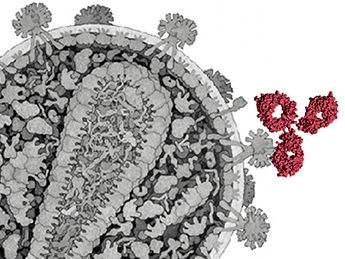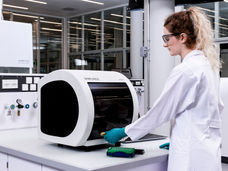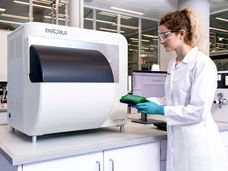Innovative Biosensors and Massachusetts Institute of Technology Announce Licensing Agreement for Biosensor Technology
Advertisement
Innovative biosensors Inc., a privately held pioneering developer of rapid diagnostic technologies, today announced that the Company has obtained an exclusive license for the CANARY(TM) biosensor technology developed at Massachusetts Institute of Technology (MIT) Lincoln Laboratory.
The CANARY(TM) technology, published in the July 11th issue of the Journal Science, uses cells of the immune system which have been engineered to express recombinant antibodies specific to the antigen of interest as well as a protein based emitter molecule in the cell's cytosol. The binding of the antigen to the engineered antibody on the cell's surface results in light emission, detectable in a sensitive and rapid fashion by a small optical detection device. This approach allows for extremely rapid testing of analytes with previously unseen levels of sensitivity and specificity.
Under the terms of the agreement, the license gives Innovative Biosensors exclusive rights to use this technology in the fields of food testing, human and animal clinical diagnostics, and sales to the life science research market.
This license makes Innovative Biosensors the only company allowed to develop, manufacture and sell instruments and kits using the cell based biosensor technology in these fields, in the United States, Canada, Europe, Japan and other countries around the world. Further details of the agreement were not disclosed.
"We are extremely delighted to have obtained rights to this novel and revolutionary technology and will move quickly to commercialize much needed rapid, sensitive and specific assays for the detection of infectious organisms," stated Joe Hernandez, Founder and CEO of Innovative Biosensors. "We are enthusiastic about the use of this technology in biothreat applications related to food testing and clinical diagnostics and in the rapid detection of emerging infectious diseases," added Mr. Hernandez.
"This agreement with Innovative Biosensors is an important milestone in the commercialization of this exciting technology," said Mark Hollis, Ph.D., leader of the Biosensor Technologies Group at MIT Lincoln Laboratory.
Most read news
Other news from the department business & finance
These products might interest you

Get the life science industry in your inbox
By submitting this form you agree that LUMITOS AG will send you the newsletter(s) selected above by email. Your data will not be passed on to third parties. Your data will be stored and processed in accordance with our data protection regulations. LUMITOS may contact you by email for the purpose of advertising or market and opinion surveys. You can revoke your consent at any time without giving reasons to LUMITOS AG, Ernst-Augustin-Str. 2, 12489 Berlin, Germany or by e-mail at revoke@lumitos.com with effect for the future. In addition, each email contains a link to unsubscribe from the corresponding newsletter.
Most read news
More news from our other portals
See the theme worlds for related content
Topic world Antibodies
Antibodies are specialized molecules of our immune system that can specifically recognize and neutralize pathogens or foreign substances. Antibody research in biotech and pharma has recognized this natural defense potential and is working intensively to make it therapeutically useful. From monoclonal antibodies used against cancer or autoimmune diseases to antibody-drug conjugates that specifically transport drugs to disease cells - the possibilities are enormous

Topic world Antibodies
Antibodies are specialized molecules of our immune system that can specifically recognize and neutralize pathogens or foreign substances. Antibody research in biotech and pharma has recognized this natural defense potential and is working intensively to make it therapeutically useful. From monoclonal antibodies used against cancer or autoimmune diseases to antibody-drug conjugates that specifically transport drugs to disease cells - the possibilities are enormous
Topic world Diagnostics
Diagnostics is at the heart of modern medicine and forms a crucial interface between research and patient care in the biotech and pharmaceutical industries. It not only enables early detection and monitoring of disease, but also plays a central role in individualized medicine by enabling targeted therapies based on an individual's genetic and molecular signature.

Topic world Diagnostics
Diagnostics is at the heart of modern medicine and forms a crucial interface between research and patient care in the biotech and pharmaceutical industries. It not only enables early detection and monitoring of disease, but also plays a central role in individualized medicine by enabling targeted therapies based on an individual's genetic and molecular signature.






















































